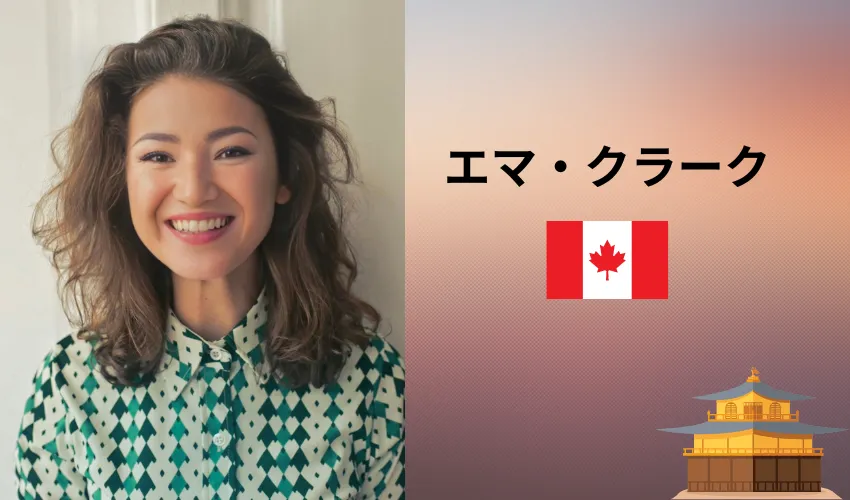International Student Interview Vol.3|Life in Japan by Goandup

Many foreign students dream of studying in Japan. However, actually living in Japan as a foreign student can be more challenging than one might imagine, with language and cultural barriers. Nevertheless, international students are growing and gaining invaluable experience day by day as they adapt to their new environment.
Goandup's International Student Interview Series spotlights international students currently studying in Japan and brings you their real voices. We hope you will feel the importance of cross-cultural understanding and international exchange through their real stories of their life in Japan, including their reasons for coming to Japan to study, the joys and troubles they experienced in their life in Japan, and their dreams for the future.
We hope that this series will provide new insights and encouragement to those interested in Japan and those considering studying abroad in the future. Please take a look at the real stories of international students studying in Japan.
▼Goandup Picks Click here for recommended articles!
- Required before studying abroad! Goandup Nihongo+, an online Japanese language learning service
- This page introduces services for foreigners who wish to study in Japan or improve their Japanese language skills to learn Japanese online.
- Goandup Salon" community for foreigners living in Japan
- We introduce an online community where foreigners living in Japan can exchange information and interact with each other to support their life in Japan.
- Goandup Study" supports foreigners who want to study in Japan.
- This section introduces study abroad support services that provide comprehensive support to foreigners who wish to study in Japan, from preparation for study abroad to living in Japan.
- Where can I buy a prepaid SIM in Japan? Recommended SIM cards for foreigners are also introduced.
- How to purchase a prepaid SIM and suitable SIM cards for foreigners.
- The Complete Guide to Pocket Wi-Fi in Japan for Foreigners!
- We introduce how to select and recommend pocket Wi-Fi products that can be used conveniently in Japan.
- The Complete Guide to Finding a Job in Japan! Finding a job, changing jobs, and part-time work for foreigners
- This site provides foreigners who want to work in Japan with comprehensive information on how to find a job, recommended job sites, and other information necessary to find a job.
Introduction of International Students

- Name:Emma Clark
- Age:22 years old
- Hometown:Toronto, Canada
- Study Abroad:Department of Japanese Literature, Faculty of Letters, National University of Kyoto
- Study Abroad Duration:From April 2023
- Study Abroad Purpose:Study of Japanese literature and history, further improvement of Japanese language skills
- Hobbies:Reading classic literature and touring Japanese castles
Interviews with international students
Hello, Emma! I am Chihiro, the person in charge. Nice to meet you.
First of all, please tell us about the background behind your decision to study abroad.
Of course. I love classical literature and have a deep interest in Japanese literature in particular. I began studying Japanese when I was in high school, after reading The Tale of Genji. I decided to study at a university in Kyoto because I felt it was important to learn about Japan's rich history and culture firsthand in its own language.
What has been a particularly memorable experience since you came to Japan?
It was a tour of Kyoto's old temples and shrines. In particular, I will never forget how beautiful it was to visit Arashiyama during the season of autumn leaves. I was also able to visit the actual settings of classical works that I had studied in my Japanese literature class, which further deepened my understanding of literary works.
Indeed, it is a wonderful experience to experience Japanese culture and history.
Is there anything that surprised you about life in Japan?
The beauty of Japan's four seasons and the richness of the culture that accompanies them. Although Canada also has four seasons, I did not realize that seasonal events and foods were so deeply rooted in the culture as they are in Japan. In particular, the customs of celebrating cherry blossoms in spring and autumn leaves in fall made me feel that respect for nature and people's lives are deeply connected.
What difficulties did you encounter while studying abroad?
One of the difficulties was understanding advanced Japanese literary terms and ancient texts. Although I had studied Japanese before, I had a hard time interpreting technical terms and literary works. However, with the support of my teachers and classmates, I am gradually deepening my understanding.
I was very bad at ancient texts, so just imagining it gives me a headache... (laughs)
Are there any problems you are facing in your life as a foreign student?
Yes, the language barrier is still my biggest concern. I find it difficult to fully express my thoughts not only in daily conversation, but also in class discussions and in writing papers. There are also misunderstandings that arise due to cultural differences, but I view this positively as part of my study abroad experience.
It is wonderful to see the positives!
How did your study abroad experience change your understanding of the Japanese language and literature?
I feel that my ability to read and understand literary works has improved, not to mention my ability to speak Japanese. In particular, a deeper understanding of the history and culture behind literary works has made the meaning of these works clearer. I also found enjoyment in reading poems and tanka poems in Japanese.
What are your plans for the future?
If possible, I would like to study Japanese literature and history at a graduate school in Japan. It may be difficult...but if not possible, I would like to return to Canada to continue my research on Japanese literature. In the future, I would like to work in a job where I can spread the appeal of Japanese literature to the world.
Finally, do you have a message for those who are considering studying abroad?
At first, you may be bewildered by the language and cultural differences, but when you overcome them, you will find that you have grown a great deal. Studying abroad is a wonderful experience that will broaden your horizons and give you new values. Please have the courage to take on the challenge and follow the path of study abroad. Kyoto is especially recommended as it offers a deep sense of Japanese history and culture!
Thank you very much for your valuable talk today.
I am sure Emma will be accepted to a graduate school in Japan!
Thank you Chihiro! I will do my best!
A Day in Japan for International Students

Here is Emma Clark's daily schedule.
7:00 AM - Wake up
I try to get up early in the morning. I often eat Japanese bread and fruit for breakfast.
8:00 AM - Study Japanese Literature
In preparation for class, I do preparatory study of Japanese literature. I am currently reading "The Pillow Book" and am fascinated by its delicate expressions. I enjoy being able to gain a deeper understanding of Japanese history and culture through literary works.
10:00 AM - Class
Classes at the university are about to begin. As a student of the Faculty of Literature, I study a wide range of subjects from classical to contemporary literature. I actively participate in class and enjoy discussions.
12:00 PM - Lunch
I have lunch with my friends at the university's café-restaurant. Japanese set menus are well-balanced and delicious. There are also cafeterias and chain cafes on campus, so I change depending on the day.
1:30 PM - Study at the library
I often spend my afternoons in the university library. I read materials on Japanese literature and prepare reports. Sometimes I do research on the places where literary works were set.
4:30 PM - Plan a tour of Japanese castles
Recently, in between classes and studies, I plan to visit Japanese castles, which is one of my hobbies. I plan to visit a castle in the suburbs next weekend. Researching its history and architecture makes me more excited to go.
6:00 PM - Dinner
Since I live alone, I often buy my lunch at a supermarket or convenience store near my house. Japanese convenience stores have a really great selection of items, and I never get tired of going there. Eating the new desserts is one of my favorite things to do.
7:30 PM - Japanese Online Lesson
I have difficulty with Japanese intonation, so I take online lessons where I can talk with a Japanese teacher in order to learn natural Japanese. Since the teacher is a woman, she is easy to talk to and I always enjoy chatting and conversing with her. My university friends have complimented me on how natural my Japanese has become recently!
8:30 PM - Free time
Since I study in the morning and during the day, I spend my evenings relaxing and making the most of the time I have. I watch Japanese anime or write in my diary to reflect on my day. I also often talk with my family in Toronto via videophone since that is just the time they wake up.
11:00 PM - Bedtime
The time I go to bed varies from day to day, but I try to go to bed before the date changes. Inspired by the Japanese Pillow Book, I sometimes read a little before going to bed.
Recommended Japanese language study methods for international students

Emma Clark tells us how she is learning Japanese in Japan. If you are currently studying in Japan or plan to study in Japan in the future, please refer to this article.
1. watch Japanese dramas and animations
I learned a lot from watching Japanese dramas and anime. At first, there were many things I could not understand without subtitles, but my listening comprehension gradually improved. I especially enjoy learning expressions and slang that appear in everyday conversation.
2. write a diary in Japanese
By writing daily events in my diary in Japanese, I can practice writing. I started with simple sentences at first, but I try to actively use newly learned Japanese as much as possible. It is a little embarrassing, but sometimes I show my diary to my teachers and friends and ask them to correct it.
3. Japanese language workshops and language exchanges
There are many language exchange groups and Japanese language study groups in Kyoto. Studying together with other foreign students helps me to understand the Japanese language from different perspectives. In addition, the language exchange has allowed me to build a relationship where we can learn from each other by teaching my English skills to the Japanese.
4. online lessons in Japanese
Because of the infrequency of Japanese language study groups and language exchanges, the "Gonandup"Individual Japanese language lessonsI try to take Since I can learn from a Japanese teacher on a one-on-one basis, I think it helps me develop my speaking and listening skills in particular.
5. explore Japanese cities on foot
It is also important to actually go out into the city and practice reading signs, menus, and information boards. Japan is full of historical sites and beautiful nature, so we recommend that you visit various parts of Japan to both learn and explore.
Serious employment support to help you realize your dream of working in Japan!

Do you want to work in Japan?
Let us "Goandup" make that dream a reality!
【 Program Features 】
✅ JLPT N3 level Japanese language acquisition
✅ Thorough preparation for the specific skills test
✅ Full support for job hunting in Japan
Business-focused one-on-one lessons will help you find a job in Japan in the shortest possible time.
【 Program Menu 】
- Individual Japanese language lessons
- Intensive curriculum to obtain N3, especially specialized lessons for business Japanese that can be used at work.
- Intensive curriculum to obtain N3, especially specialized lessons for business Japanese that can be used at work.
- Preparation for the Specific Skills Test
- Customized materials for specific skill tests will be used to focus on frequently asked questions and learning to pass the test.
- Customized materials for specific skill tests will be used to focus on frequently asked questions and learning to pass the test.
- Resume and CV support
- To create resumes and CVs tailored to Japanese corporate culture, and to brush up on self-promotion and motivation for application.
- To create resumes and CVs tailored to Japanese corporate culture, and to brush up on self-promotion and motivation for application.
- Interview Preparation
- Guidance on areas for improvement through mock interviews and feedback based on corporate interview scenarios. Learn interview etiquette and behavior unique to Japan.
- Guidance on areas for improvement through mock interviews and feedback based on corporate interview scenarios. Learn interview etiquette and behavior unique to Japan.
- career consulting
- Provide introductions to companies that match the participant's career goals, select companies to apply to, and provide advice on the level of knowledge required by the companies to which the participant is applying.
- Provide introductions to companies that match the participant's career goals, select companies to apply to, and provide advice on the level of knowledge required by the companies to which the participant is applying.
- Chat Support
- In addition to one-on-one individual lessons, we also accept casual questions via DM (visa application, living support, assistance in finding a room, etc.).
If you are serious about your career in Japan, join us now!
▶︎ for more informationclick here.
We will do our best to support your success in Japan!
Finally.
Emma Clark's study abroad experience in Kyoto is a wonderful example of an in-depth exploration of Japanese culture and language. Her experience of the beauty of Japan's four seasons, the fascination of classical literature, and her daily language study show how enriching studying abroad in Japan can be. The language barriers and cultural differences that one faces when studying abroad are a great challenge, but the growth and learning that one can achieve by overcoming them is immeasurable.
In addition, Emma's efforts to learn Japanese through one-on-one Japanese lessons and Japanese dramas and anime are valuable tips that will help her before she studies abroad.
We hope that through this series, we have been able to motivate those of you who are interested in Japanese culture and language and dream of studying abroad to do so. We sincerely hope that by proactively engaging in language study before and during your study abroad, as you do with our online Japanese lessons, you will have a more fruitful study abroad experience. Studying abroad is a great opportunity to discover a new you and expand your world.
In this series of interviews with international students, we have collected valuable stories from international students with diverse backgrounds. Please check out the stories of other international students!
- International Student Interview Vol.1|Life in Japan by Goandup
- International Student Interview Vol.2|Life in Japan by Goandup
- International Student Interview Vol.3|Life in Japan by Goandup
- International Student Interview Vol.6|Life in Japan by Goandup
- International Student Interview Vol.5|Life in Japan by Goandup
- International Student Interview Vol.6|Life in Japan by Goandup
Your support will help us!
Thank you for visiting Goandup Picks. Our mission is to provide you with more useful information to show the world what Japan has to offer.
Your support will help us to further enhance our activities, so please support us!





